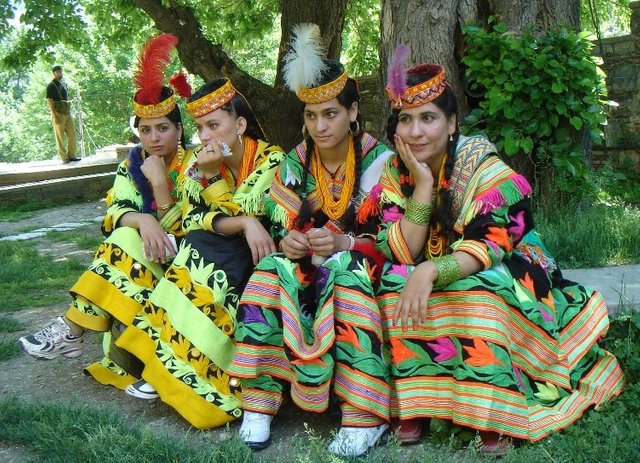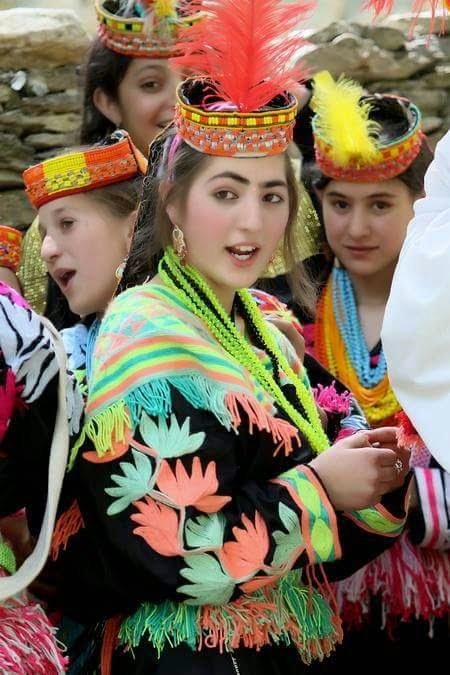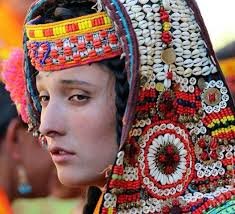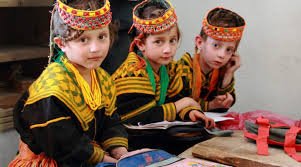kalash Tribe in pakistan
Do you know the Kalasha tribe of Pakistan?
JANUARY 29, 2013 / THE KALASHA TIMES
By: Luke Rehmat
History
Map of Kalash valleyThe Ka’l’s’a (Kalash or Kalasha) are a small ethnic and religious community living near the western borders of the Chitral District, close to the neighbouring Afghan province of Nuristan (Nooristan). Shrouded in mystery, there are many different claims about the history and origin of the Kalasha peoples. The majority of writers, scholars, anthropologists, and linguists, point to a pervasive myth that testifies to the Kalasha as the descendants of the armies of Alexander the Great.In the past, the Kalasha peoples ruled for many centuries over territory that stretched from Chitral to Asmar in Aghanistan.
I was born into a Kalasha family known as Aspa’I’n Nawaw. I have practice the Kalasha religion, culture and tradition since my birth, nearly 24 years ago. From my research work in my own village, I have concluded that my people have lived in these valleys for as long as we have been a distinct community. Kalasha peoples firmly believe that originally, we came from a place called Tsiam. Some people say that Tsiam is the ancient name of Thailand, a claim that most of us consider unlikely.
Within the Kalasha community there are some people in Biriu (Birir) valley, who originally came from Majam in Nuristan (Nooristan). The cultural traits of these Biriu residents, particularly their rituals, differ from the rest of the Kalasha communities. However in their, and costumes they are brethren to the people of Rukmu and Mumuret. The people of Rukmu and Mumuret are culturally very similar and there is little difference between them.
We must now turn to the key issue: what is the essence of the Kalasha way of life? What makes us distinct? One thing is clear, the Kalasha are a unique people, unlike any other on the globe in our cultural practices. As a point of comparison, history and legend tell us, for example, that Mullah Nasir Uddin was a unique man. Many nations, including Iran, have claimed him as one of their own. His exploits have become the stuff of legend, stories I learnt myself while studying at school. Those who wrote down his achievements and philosophy make one thing clear: he was a unique man. We, the Kalasha, are the same. We too, are unique.
Recent news reports point to archeological evidence that suggest that the Kalasha peoples were the ancient inhabitants of the Swat region. Likewise, the Bulgarian ambassador, during his visit to Chitral, said in an interview to an online news service that the ‘’Kalasha peoples are descendants [i.e. of the Bulgarians]’’. The Greek people are similarly confident and claim the Kalasha as their descendants, working with the Kalasha communities in the valleys since 1998. What I understand is that further scientific research needs to be done to determine the ‘’origin of Kalash’’, and these results must be shared with the community.
Culture
promo
The Kalash people, and our way of life, clearly differ from both the surrounding cultures of Pakistan, and the rest of the world. We are a flexible people, living happily. By a definition of culture as ‘’something socially learnt and shared by members of the community’’, we, the Kalasha, have doubtless, a rich and ancient culture. Some years back the Greek volunteers in the valleys said that the ‘’Kalasha are the cultural heroes of 21st century’’. The Kalasha way of life is finely balanced, allowing both men and women to do their duties freely. The Kalasha society is not a male-dominated society like other communities in Pakistan. Our social organisation is very effective, and ensures there is no cruelty or discrimination based on issues of gender. Kalasha women feel comfortable living in a society which gives them respect and freedom. In her work, American anthropologist Wynne Maggi describes the difference between the Kalasha and other people. The difference – the title of her book – is quite simple, “our women are free”.
The Kalasha culture is appreciated globally. Our society is optimistic even in the face of significant challenges and changes facing us. We know we cannot stop these changes, but we can effectively slow down the pace of change. In the Kalasha culture, one cannot marry with a close relative, including second cousins not within the same caste. Some 50 years ago the engagement system was strong and there were fewer love marriages, however since that time there has been a decline in arranged marriages and love marriages have become more popular. This is because the lack of freedom of choice in arranged marriages doomed many of them to failure. Consequently, people started to adopt love marriages as a more effective alternative with less chance of the marriage ending in divorce. All cultures are in flux, constantly adapting and changing to new situations, and tolerance and flexibility ultimately emerge once a society learns that change does happen, and that alternative options can be adopted successfully.
Custom
KONICA MINOLTA DIGITAL CAMERA
The Kalash peoples believe in a single, creative God, referred to in the Kalasha language as Dezau, although we use the Persian term Khudai as well. Much literature written on the Kalasha religion has incorrectly mentioned that the Kalasha peoples believe in twelve Gods and Goddesses. Why did the authors report this to be the case? Doubtless the reason lies in a communication gap between the writer and the person interviewed. For example, different Kalasha alters and temples were incorrectly understood to be places of worship for separate and distinct Kalasha deities. While it is correct that the Kalasha people do have different names of alters such as Sajigor, Indrain and Warin etc., these alters are all ultimately a place to offer sacrifice to Dezau. Kalasha peoples do not have any routine daily prayers, like the Muslim communities have in the valleys. They do pray whenever they initiate any activities like harvesting, ploughing, construction and whenever the favour and honour of Dezau is needed. Most prayers are offered during Kalasha festivities. There is a strong belief of in purity and impurity in the Kalasha culture. In the Kalasha belief system women are considered to be especially impure during menstruation and childbirth. There is a separate building for these women and it is prohibited for men to enter the area. The area is known as Bashali.
Costume
Kalash women have a unique and colorful dress that serves as the most obvious symbol of identity for the Kalash community, as any outsiders that enter the valleys can recognize them easily. Historically, women used woolen cloths with embroidered designs. With the passage of time the raw materials become rare and expensive and they subsequently adopted cotton and silk fabrics. Kalasha male dresses had already changed some 50 years ago due to shortage and non-availability of wool. But there is an occasion during Cawmos, the winter festival, on the 19th of December every year when they use their traditional cloth for boys in a special ceremony.
Survival state
For most of our history, the Kalash valleys remained cut off from the rest of the world. The centuries of isolation provided an opportunity for us to sustain this unique culture. The Kalash culture does not have any attested documented form, it is an oral tradition performed practically. Our people are more committed and steadfast than ever before to sustain our culture for the younger generation. Historically, many people lost their lives but did not change their faith. Our elders used to say some years ago that during Zhoshi, the spring festival, in the Shishi Ku valley people were forced to convert to Islam and rather than convert, some 70 girls and boys ended their lives by throwing themselves into Shishi River. Later in the 18th and 19th centuries it was very difficult for Kalasha people to carry on their culture and religion. Very few families escaped forced conversion in the valleys. But in the 1970s, when Prime Minister Zulfikar Ali Butto visited the region, he introduced this culture to the nation and the world promising to protect and defend its uniqueness.
Universal value
I have earlier argued that the Kalasha culture is one of the ancient and rich cultures from across the world. That which might be described as being of universal value, would be something which was extraordinary and unlike anything else in other parts of the world. The Kalasha live in three small valleys of Pakistan only, and there are no signs of Kalasha culture elsewhere in the world. Our culture has survived for thousands of years and is still alive. Our culture is then, both extraordinary, and of universal value.
What has the government done so far?
The Kalasha valleys are well known for being a very remote part of the country in terms of development and facilities, despite the fact that the Kalasha valleys are richly endowed with cultural assets and natural resources. Unfortunately, the government of Pakistan had ignored this region and has paid scant attention to its development and preservation. While the government has inscribed shrines, mosque and forts on the World Heritage list, and even put forwarded the Kalash valleys, we are not included in on the National Heritage list. The National Registration Authority that created a database in 2008, providing a religion check box, did not include the Kalasha religion on that list, a highly problematic development. Institutionally, the NADRA now indicates that there are no Kalasha ethnically or religiously in the government record. As a result, we are forced to indicate Islam, Buddhist, Yarsi etc. on our identity cards and passports.
When it comes to diversity and cultural icons, the government does not hesitate to showcase the Kalash culture to visitors and guests. However, Kalash culture remains little more than a showpiece for government officials. The government itself has done nothing for our tribe except building irrelevant constructions in the Kalasha valleys, which undermine its natural beauty and destroy the Kalasha’s tangible heritage. There have been no positive steps taken by government for the conservation of Kalasha culture so far. In schools Kalash students are compelled to undertake Islamic studies, because there is no option for minority students to study another subject. The preaching of Islam by Muslim teachers in the schools and pressure of Muslims students creates hatred among the Kalasha for their culture and religion and induces them to abandon their heritage and convert from their religion. The quote below indicates how government neglect and exploitation pressures the Kalasha to abandon their culture:
Abdul Sattar, a village elder who has converted to Islam, tells me that “before, when I was Kalash, I was very happy. But the government and people from the rest of Pakistan were coming here and making us dance and perform. I became a Muslim because I couldn’t enjoy performing for outsiders” – Quote from the Observer Feb 2011
In February 2012, the Ministry of National Heritage organized a one-day workshop on World Heritage matters and scheduled another meeting of the member’s committee (12) but failed once again. According to the authorities, there is no funding to work for this purpose. Our question is, ‘why?’
Events
The Kalash peoples have four main seasonal festivals per year. Zhoshi, the spring festival, is held from May 14th to 16th Ucaw, the autumn festival, falls on the 18th to 22nd August, but the preparation begins in July. The P’O’ festival starts in mid October, and is held only in Biriu valley. Finally, Cawmos, the winter festival goes from the 7th of December to the 22nd every year. There are many occasional festivities as well.
Sports
Kirik Ghal the Snow golf.
There are many sports played in the valleys, but I would love to introduce the game called cikik ghal, kirik ghal and him ghal meaning ‘’snow golf’’, which is a famous sport during winter. It is played between two villages and there are no specific players. Victory is achieved by winning the best of three, and the losing team must sacrifice a bull to provide food for the winning team and arrange a musical party to enliven spirits after the exhausting day. On February 2012 our traditional sports development programme had organized an indigenous winter sports festival and formed a standard team, consisting of 24 members including captain and coach. This step was taken to preserve the game because it was being lost with the passage of the time. The sport is very emotional and there is a slight risk of fighting. In order to minimize risk during the game we sought to have some standardized rules to continue this unique game. The same organization has planned to another winter sports festival in 2013 as well. Do not miss the chance to come to witness and enjoy such a unique sporting occasion.
Challenges
Conversion of religion
Kalash settlements are being encircled by the growing Muslim population year by year.
In the absence of a curriculum for minorities in government schools, Kalash students are forcefully taught Islamiyat and compelled to convert to the majority faith (Islam)
There is no instrument, law or legal protection of the culture, faith and property of the Kalash minority in the prevailing legal system in Pakistan.
There is an unprofessional approach towards the ‘’so-called’’ conservation and protection of Kalash culture on the part of the government as well as donors and NGOs, with the exception of only a few.
Suggestion
Based on ECOSOC conventions and the UN General Assembly resolutions, the Kalash culture should be declared a UNESCO World Heritage the site, so that serious efforts for the protection and conservation of Kalash culture may be undertaken by the global community
The subject of ethics should be introduced in the schools of Kalash valleys instead of Islamiyat to check the progress of forced conversion of Kalash youth by Muslim teachers
● Government of Pakistan and UNESCO should give international exposure to the Kalasha ethnic community by arranging foreign visits to World Heritage sites
The Government of Pakistan should allocate a separate seat for the Kalash minority both in the provincial and National Assembly
Last, but not the least, the Government of Pakistan should prepare a comprehensive development package for the Kalash minority. The package should include certain incentives to protect the threatened and endangered community.
Government should allocate a quota and scholarship programme for Kalasha students in professional colleges and universities in Pakistan, and also a quota system for employment in different departments. The Kalasha religion is not recognised or included in the NADRA data base which creates further hurdles for the Kalash people.



one of the beautiful tribe in pakistan
This post has received a 1.15 % upvote from @morwhale thanks to: @shahzad.riaz.